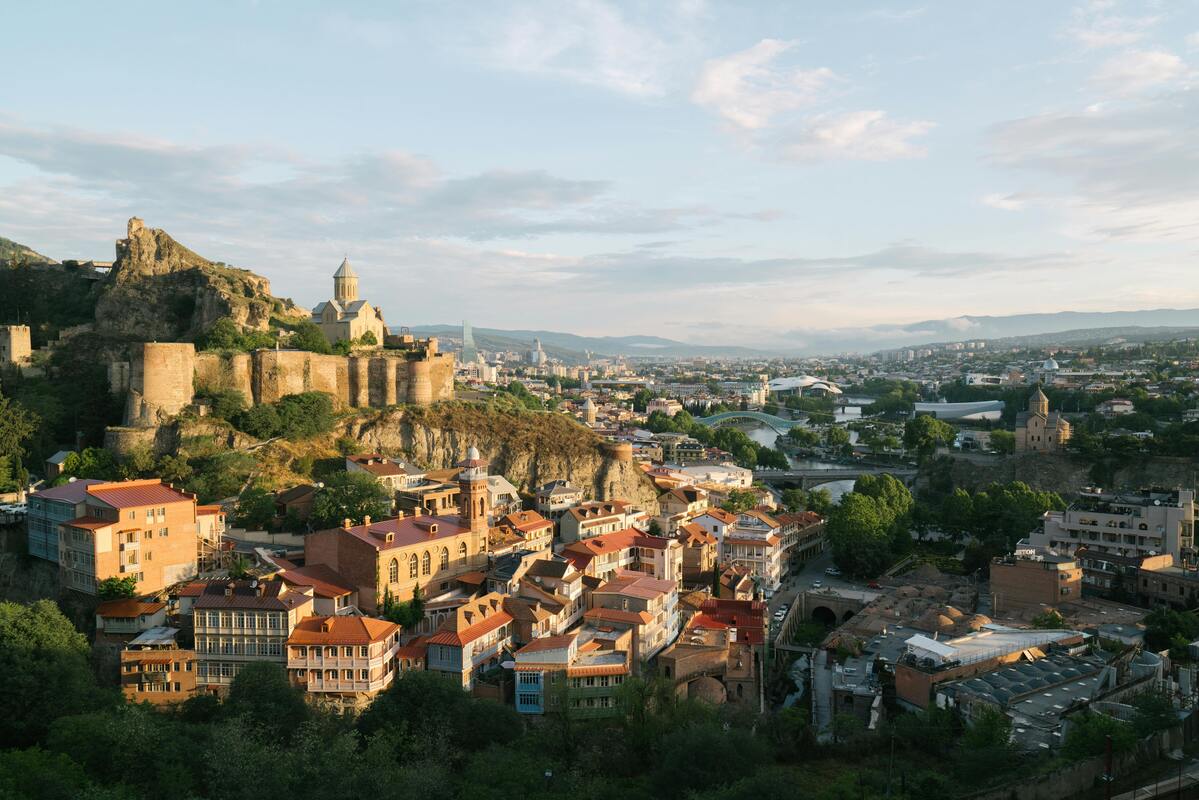Introduction
Gamarjoba! (That's "hello" in Georgian, and trust me, you'll be hearing it a lot.) So you're thinking about Georgia? Not the US state with the peaches – we're talking about the country that most people can't find on a map but should definitely have on their bucket list.
I've been living here for over two years now, and let me tell you something: Georgia is like that friend who seems too good to be true until you realize they actually are that amazing. We're talking about a country where you can get visa-free entry for a YEAR, where a bottle of excellent wine costs less than a Starbucks coffee, and where strangers will literally invite you to their family dinner after knowing you for five minutes.
From Tbilisi's chaotic but charming streets (where ancient churches sit next to hipster coffee shops) to Batumi's seaside party vibes and the mountains that'll make you question why you ever lived anywhere flat, Georgia's got this weird magic that hooks people. Fair warning: most expats I know came for a month and are still here years later.
Important Notice: As of January 2025, Georgia has implemented a new digital nomad visa program offering one year stays with simplified tax procedures. Applications can be submitted online through the Georgian e-Visa portal.
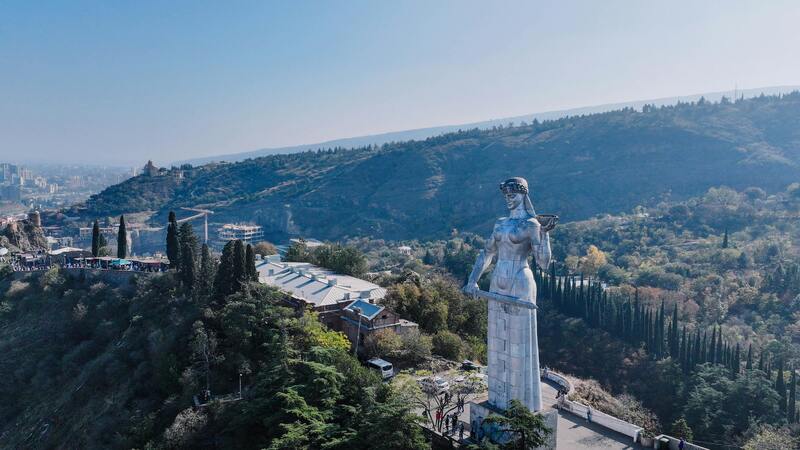
Tbilisi, the capital of Georgia, with its mix of ancient and modern architecture
Visa Programs
- Visa-Free Entry: Citizens of 90 countries can stay in Georgia for up to 365 days without a visa, making it one of the most accessible countries for long-term visitors.
- Remote Work Visa ("Remotely from Georgia"): Georgia's digital nomad visa program allows remote workers, freelancers, and entrepreneurs to stay and work remotely for up to one year. This visa is application-fee free and offers tax benefits for qualified applicants.
- Residence Permit: Available through property investment (purchasing real estate worth at least $100,000), business registration, or employment with a Georgian company.
- Work Permit: For those with job offers from Georgian companies.
- Investment Visa: For those making significant investments in Georgian businesses or real estate.
Digital Nomad Visa Requirements: The "Remotely from Georgia" visa requires: a valid passport (valid for at least 3 months beyond planned departure), proof of employment or business ownership, comprehensive health insurance, and proof of sufficient financial means to support yourself during your stay. The application is processed within approximately 10 business days.
Tax Benefits: Digital nomads in Georgia enjoy tax exemptions until their 183rd day of stay. After becoming a tax resident, the standard income tax rate is approximately 20%. However, freelancers and digital nomads can register as Individual Entrepreneurs and pay only 1% on their initial income, making Georgia exceptionally tax-friendly for remote workers.
Premium Georgia Remotely From Georgia Visa Checklist
Planning to apply for Georgia's digital nomad visa? Our comprehensive checklist makes the process simple:
- Complete step-by-step application guide
- Current financial requirements
- Online application walkthrough
- Health insurance and tax implications
Cost of Living
Georgia offers an exceptionally affordable cost of living compared to Western countries. Here's what you can expect:
- Monthly budget for comfortable living: $700-1,500 USD depending on lifestyle and location
- Rent: $250-600 USD for a nice one-bedroom apartment in good areas of Tbilisi
- Utilities: $50-100 USD per month including high-speed internet
- Internet: $15-25 USD for high-speed fiber (100 Mbps+)
- Mobile Plan: $5-15 USD with excellent data coverage
- Groceries: $100-200 USD per month
- Eating out: $5-15 USD for a good meal with wine
- Transportation: $0.20 USD for public transport; $2-4 USD for taxi rides in cities
💡 Pro Tip: For a complete breakdown of the cost of living, check out this detailed guide in the Moving to Georgia Guide.
Popular Cities for Expats
Tbilisi
Georgia's capital is the heartbeat of the country's expat scene. The city beautifully blends centuries-old architecture with ultra-modern designs. Old Tbilisi offers charming cobblestone streets and traditional Georgian houses with carved wooden balconies, while districts like Vake and Saburtalo provide more contemporary living options.
Best for: Digital nomads, startup entrepreneurs, and culture enthusiasts
Monthly rent: $300-700 for a modern one-bedroom apartment
Expat community: Very large and active with regular meetups and events
Notable areas: Vake (upscale), Vera (bohemian), Old Tbilisi (historic), Saburtalo (affordable modern)
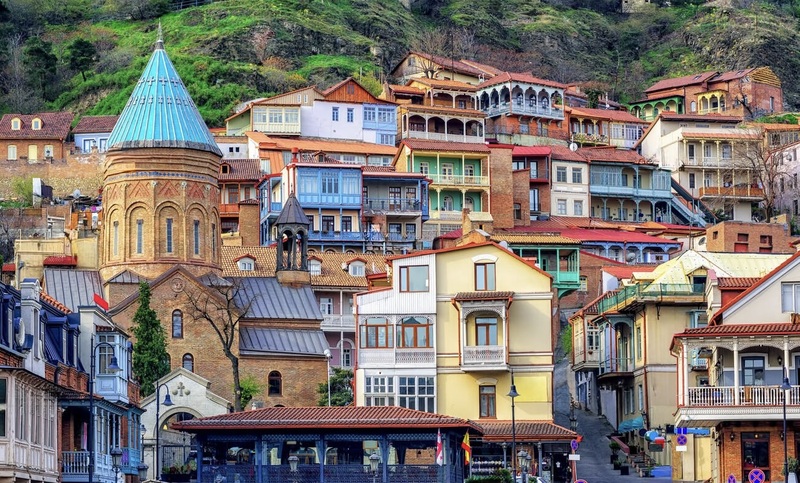
Traditional wooden balconies in Old Tbilisi
Batumi
This Black Sea resort city has transformed into a modern coastal hub with a growing expat community. Known for its pebble beaches, vibrant nightlife, and subtropical climate, Batumi offers a unique blend of leisure and urban living. The city is particularly popular during summer months when the promenade comes alive with activities.
Best for: Beach lovers, seasonal residents, and those who enjoy warmer climates
Monthly rent: $250-600, with significant seasonal variations
Expat community: Medium-sized, growing rapidly in summer
Notable areas: New Boulevard (modern), Old Batumi (character), Batumi Beach District (convenient)
Getting around Batumi is relatively straightforward, with public transportation in Batumi including buses and marshrutkas (minibuses) that connect most areas of the city. The city is also quite walkable, especially along the scenic boulevard area.
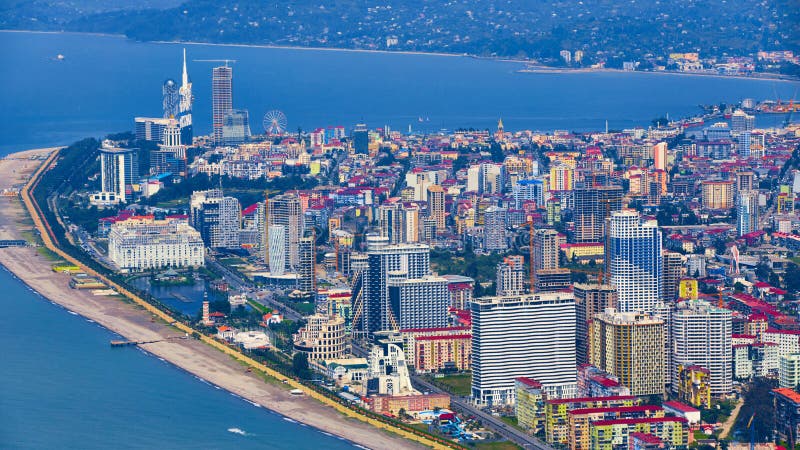
Aerial view of Batumi with its iconic skyline along the Black Sea coast
Kutaisi
Georgia's third-largest city offers a more authentic Georgian experience with significantly lower costs than Tbilisi or Batumi. With its UNESCO World Heritage sites, beautiful architecture, and proximity to natural wonders like the Prometheus Cave, Kutaisi provides a perfect balance for those wanting to immerse in Georgian culture while enjoying modern amenities.
Best for: Budget-conscious expats, cultural enthusiasts, and slow travelers
Monthly rent: $150-350 for a comfortable apartment
Expat community: Small but growing, with a friendly atmosphere
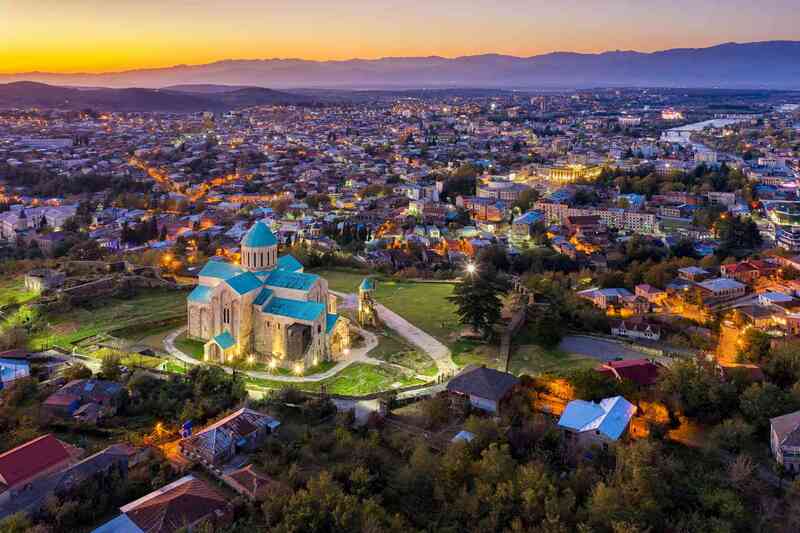
Panoramic view of Kutaisi with its historic architecture and surrounding landscape
Real Talk: If you're new to Georgia, start with Tbilisi. I know it sounds basic, but hear me out – it's where you'll figure out how things actually work here (spoiler: they work differently than anywhere else). Plus, the expat community will basically adopt you within a week. Once you've got your bearings, then go explore Batumi for beach vibes or Kutaisi for the "real" Georgia experience.
Kazbegi (Stepantsminda)
For nature lovers and digital nomads seeking tranquility, this mountain town offers breathtaking views of the Caucasus Mountains, including the iconic Mt. Kazbek. The dramatic landscape, clean air, and slower pace of life make it ideal for those looking to escape city living while maintaining connectivity for remote work.
Best for: Nature enthusiasts, writers, and remote workers seeking inspiration
Monthly rent: $200-450, with limited availability
Expat community: Very small, mostly seasonal digital nomads
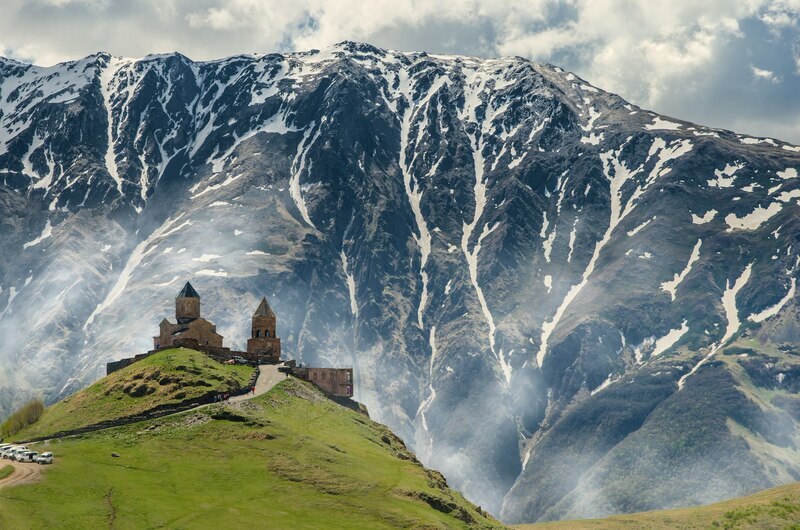
Gergeti Trinity Church with Mt. Kazbek in the background, Kazbegi region
Borjomi
Famous for its mineral waters, this spa town nestled in a picturesque valley offers a therapeutic retreat. Surrounded by forested mountains and natural springs, Borjomi provides excellent hiking opportunities and a peaceful environment for health-conscious expats.
Best for: Health enthusiasts, nature lovers, and retirees
Monthly rent: $200-400, depending on season
Expat community: Very small, mostly long-term residents
Job Market for Expats
While many expats in Georgia work remotely for foreign companies, the local job market is also developing opportunities for internationals:
- Popular Industries for Expats:
- English teaching (high demand in language schools and private tutoring)
- Tourism and hospitality (especially in Tbilisi and Batumi)
- IT and software development (growing tech startup scene)
- International organizations and NGOs
- Digital marketing agencies serving international clients
- Average Local Salaries: $400-1,200 USD monthly, depending on industry and experience
- Work Permits: Generally obtained through employers, with processing times of 1-2 months
- Networking: Most jobs are found through personal connections and expat networks rather than formal job boards
- Entrepreneurship: Georgia ranks highly for ease of starting a business, with minimal bureaucracy and low tax rates
Important: Local salaries are significantly lower than Western standards. Most expats working for Georgian companies supplement their income with freelance work or remote positions for foreign employers.
Banking and Taxes
- Bank Account: Foreigners can easily open a Georgian bank account with just their passport, a major convenience compared to many countries that require residency
- Tax Benefits: Georgia offers a 1% tax rate for individual entrepreneurs under the "small business" status
- Business Registration: Setting up a company is straightforward and can be completed in 1-2 days
- Tax Residency: Becoming a tax resident requires spending 183+ days in Georgia
- Digital Nomad Taxation: Remote workers on the "Remotely from Georgia" visa aren't subject to Georgian taxes on foreign-earned income until their 183rd day of stay
- Individual Entrepreneur Scheme: Digital nomads can register as Individual Entrepreneurs, paying only 1% tax on income, making Georgia one of the most tax-friendly destinations for remote workers
- International Banking: Major Georgian banks like TBC and Bank of Georgia offer excellent online banking in English with international transfers
- Payment Apps: Services like TransferWise (Wise) and Revolut work well with Georgian bank accounts
Financial Advantage: The combination of low cost of living, easy banking access for non-residents, and the favorable 1% tax rate under the Individual Entrepreneur scheme makes Georgia one of the most financially advantageous destinations for digital nomads and remote workers worldwide.
Banking Security Alert: Always use ATMs attached to banks rather than standalone machines, especially in tourist areas. Shield your PIN, be vigilant about card skimming devices, and set up SMS notifications for all transactions to monitor your account activity in real-time.
Culture and Lifestyle
Okay, let's talk about Georgian culture, because it's going to blow your mind. Imagine if Europe and Asia had a baby, raised it on the world's best wine, and taught it that hospitality is a competitive sport. That's Georgia.
- Supra (The Ultimate Dinner Party): This isn't just a meal – it's a three-hour commitment to eating, drinking, and toasting everything from your health to world peace. Pro tip: pace yourself, because saying no to more wine is basically insulting your host's ancestors.
- Hospitality That'll Make You Uncomfortable: Georgians will literally fight over who gets to pay for your dinner. I've seen grown men argue for ten minutes over a 15 lari bill. Being invited to someone's home is like winning the cultural lottery.
- Polyphonic Singing: You know those spine-tingling harmonies that make you question your life choices? That's Georgian polyphony, and yes, random people will just start singing together at parties.
- Orthodox Everything: Churches are everywhere, and they're gorgeous. Even if you're not religious, the architecture alone is worth checking out. Just dress modestly – tank tops and shorts are a no-go.
- Family First, Always: Three generations living together isn't unusual – it's normal. And before you judge, these families are usually happier than most Western nuclear families I know.
- Work-Life Balance Champions: Georgians figured out something we're still learning: work exists to fund life, not the other way around. Don't be surprised if business meetings turn into wine tastings.

A traditional Georgian supra (feast) with an array of local dishes

Traditional Georgian dance performers showcasing the country's rich cultural heritage
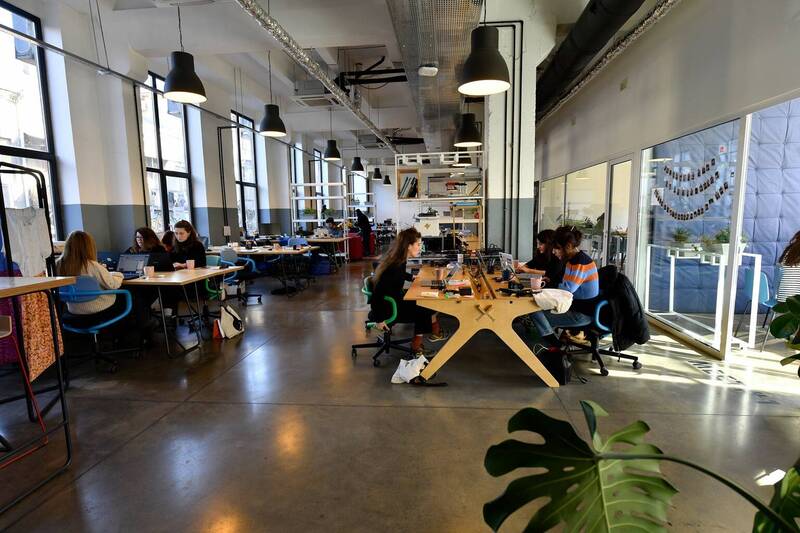
Modern coworking space in Tbilisi popular with expats and digital nomads
Entertainment and Activities
Georgia offers a diverse range of activities for expats, from outdoor adventures to cultural experiences:
- Outdoor Adventures:
- Hiking in the Caucasus Mountains (popular routes in Kazbegi, Svaneti, and Tusheti)
- Skiing and snowboarding in Gudauri and Bakuriani during winter months
- Beach activities along the Black Sea coast in summer
- Paragliding in Gudauri with spectacular mountain views
- Cultural Experiences:
- Wine tours in Kakheti, the birthplace of wine with 8,000 years of winemaking history
- Traditional dance performances at venues like the Tbilisi Concert Hall
- Thermal sulfur baths in Tbilisi's Abanotubani district
- Exploring ancient cave cities like Uplistsikhe and Vardzia
- Nightlife:
- Tbilisi's vibrant club scene, especially in the Fabrika and Shardeni Street areas
- Craft beer bars and speakeasy cocktail venues in Tbilisi
- Seasonal beach clubs in Batumi during summer
- Social Events:
- Weekly expat meetups (Tbilisi Expat Meeting, InterNations events)
- Language exchange gatherings (popular in Fabrika and various coffee shops)
- Outdoor yoga groups and fitness communities
Mountain Reality Check: Georgian mountains are stunning but they don't mess around. I've seen too many people underestimate a "simple" hike and end up in trouble. Check the weather (it changes fast), tell someone where you're going, bring way more water than you think you need, and seriously consider a guide for anything beyond the tourist trails. Your phone will become a paperweight once you're out there, so download offline maps beforehand.

Hiking in the stunning Caucasus Mountains offers breathtaking views
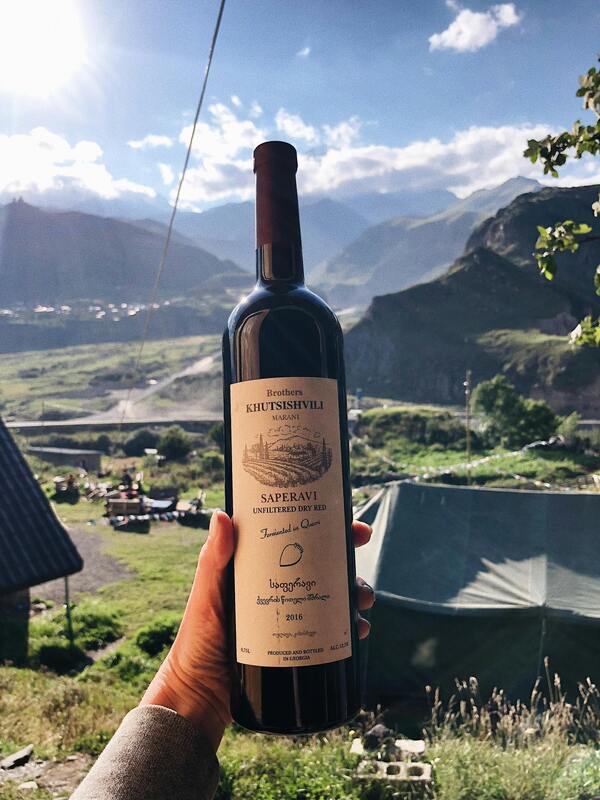
Wine tasting is a must-do experience in the country that claims 8,000 years of winemaking history
Language Resources
While many Georgians in Tbilisi speak English, learning some Georgian will enhance your experience and open doors to deeper cultural connections:
- Georgian Language Schools:
- Tbilisi Language Exchange Center - Comprehensive courses with flexible schedules
- Nino's Georgian Language School - Specialized in small group and individual lessons
- American Language Center Tbilisi - Group classes with cultural immersion activities
- Expat Alliance Georgian Classes - Taught by bilingual instructors specifically for expats
- Language Apps: Ling, Mondly, Drops (all have Georgian modules), and Georgian-specific apps like "Learn Georgian"
- Language Exchange: Weekly meetups in major cities (check Facebook groups like "Georgian Language Exchange Tbilisi")
- Online Resources: The "Teach Me Georgian" YouTube channel and georgianlanguage.org offer free lessons
- Practical Tip: Learning the Georgian alphabet (33 unique letters) first makes navigation much easier
Language Game-Changer: Look, Georgian is hard. Like, really hard. The alphabet looks like someone sneezed on a page of elegant squiggles. But here's the thing: learn just "gamarjoba" (hello), "gmadlobt" (thank you), and "tu sheidzleba" (please), and watch Georgians' faces light up like you just performed magic. They're so used to foreigners not even trying that basic politeness in Georgian will make you their favorite person instantly.
Digital Nomad Resources
Internet & Connectivity
Georgia offers excellent internet infrastructure that rivals many Western countries:
- Internet Speed: Average speeds of 50-100 Mbps in urban areas, with fiber connections up to 1 Gbps available in Tbilisi and Batumi
- Mobile Data: 4G coverage is excellent in cities and tourist areas; 5G is available in parts of Tbilisi and expanding
- Mobile Providers:
- Magti: Widest coverage and fastest speeds, slightly more expensive
- Geocell: Good balance of coverage and cost
- Beeline: Most affordable option, though coverage can be spotty outside major cities
- SIM Cards: Available for 3-5 GEL ($1-2) with ID at provider shops, airports, and many convenience stores
- Data Plans: Extremely affordable compared to Western prices (15GB for about $7-10 USD)
- Power Stability: Generally reliable in cities, though occasional brief outages can occur in older districts
Coworking Spaces
- Tbilisi:
- Terminal Tbilisi: Premium workspace with 24/7 access, meeting rooms, and a vibrant community of international professionals
- Impact Hub Tbilisi: Social entrepreneurship focus with frequent events and workshops
- Lokal Tbilisi: Boutique coworking with a creative atmosphere and garden space
- Regus Tbilisi: Professional environment with multiple locations across the city
- WorkFrom Tbilisi: Modern space with breathtaking city views
- Batumi:
- Batumi Coworking Center: Affordable space near the beach with sea views
- Work Inn Batumi: Modern facilities with both hot desks and private offices
- Daily Rates: $5-15 USD depending on location and amenities
- Monthly Passes: $60-150 USD for unlimited access
Nomad Communities
- Online Groups:
- Expats in Tbilisi (Facebook): Largest group with 45,000+ members, active daily discussions
- Digital Nomads Georgia (Facebook): Focused on remote work, events, and accommodation sharing
- Tbilisi Digital Nomads (Telegram): Real-time communication for meetups and questions
- Georgia Expat Hub (Discord): Growing community with dedicated channels for different topics
- Regular Meetups:
- Tbilisi Digital Nomad Tuesdays: Weekly gathering at various venues
- Expat Coffee Club: Saturday morning meetings for networking
- Nomad Skill Share: Monthly workshops where nomads teach their specialties
Tips for New Expats
Housing
- For long-term stays, negotiate discounts of 20-30% off listed prices, especially for 6+ month commitments
- Always view apartments in person before paying—photos often don't show heating systems or noise issues
- Check for heating options in winter months (gas heating is more reliable than electric)
- Facebook groups like "Tbilisi Apartment Rentals" offer better deals than Airbnb for monthly rentals
- Older buildings have more character but may have infrastructure challenges; newer buildings offer better amenities
Money & Finances
- Always have some cash (GEL) on hand, especially outside major cities
- ATMs are widely available in cities; those attached to banks usually have better rates
- Wise (TransferWise) offers excellent exchange rates for transferring money to Georgia
- TBC and Bank of Georgia ATMs generally offer fee-free withdrawals
- When setting up a Georgian bank account, request both a VISA and Mastercard for maximum flexibility
Food & Dining
- Georgian cuisine is exceptional and very affordable—don't miss khachapuri, khinkali, and mtsvadi
- Wine culture is important; Georgia claims to be the birthplace of wine (8,000+ years)
- Try qvevri wines for a unique taste of traditional Georgian winemaking
- Grocery delivery apps like Glovo and Wolt deliver from supermarkets and local markets
- Vegetarians can ask for "samarkhvo" dishes, which are meat-free options prepared for religious fasting periods
Communication
- The Georgian alphabet is unique; consider learning to read basic signs
- The country code for Georgia is +995
- Google Translate works well for Georgian in written form
- Direct communication is appreciated; Georgians tend to be straightforward
- Learn a few basic phrases like "gamarjoba" (hello) and "gmadlobt" (thank you)
Transportation
- Transportation apps like Bolt work very well in major cities
- Tbilisi metro costs only 1 GEL ($0.30) per journey regardless of distance
- For intercity travel, the Georgian Railway offers comfortable and scenic journeys
- Marshrutkas (minibuses) are the most affordable way to travel between cities but can be cramped
- Consider renting a car for exploring remote regions, but be prepared for challenging mountain roads
Healthcare
- Private clinics in Tbilisi offer good quality care at affordable prices
- New East Medical Center and American Medical Center are popular with expats
- Travel insurance with evacuation coverage is recommended
- Medications are widely available and often don't require prescriptions
- Dental care is excellent and very affordable compared to Western prices
Weather & Seasons
- Bring warm clothes if staying during winter; many apartments have inconsistent heating
- Tbilisi summers can be very hot (35°C+), while mountain regions remain cooler
- Spring (May-June) and fall (September-October) offer the most pleasant climate
- Check air quality apps during winter in Tbilisi as inversions can trap pollution
- Weather can change rapidly in mountain regions; always be prepared when hiking

Tbilisi's cafe culture is perfect for digital nomads and remote workers
Pro Tip: For the best experience, try to stay in Georgia for at least three months. The first month is typically spent getting settled, the second month exploring the city, and by the third month, you'll start to develop meaningful connections with locals and truly experience Georgian hospitality.

Traditional Georgian winemaking with qvevri clay vessels
The Bottom Line
Here's the deal with Georgia: it's one of those places that sounds too good to be true until you actually get here and realize it's somehow even better than advertised. Visa-free for a year? Check. Wine that costs less than water? Check. People who will adopt you into their family after one dinner? Double check.
I've lived in a lot of places, and Georgia has this unique combination of being ridiculously affordable while not feeling like you're sacrificing quality of life. Whether you end up in Tbilisi getting lost in the maze of old town streets, lounging on Batumi's beaches wondering why you ever paid European prices for seaside living, or hiking in mountains that look like they belong in a fantasy movie, you're going to have stories.
Fair warning though: Georgia has a habit of turning short visits into permanent relocations. Don't say I didn't warn you when you find yourself googling "how to start a business in Georgia" six months into what was supposed to be a three-week trip.
Long-Term Planning: Many expats initially come to Georgia for 3-6 months but end up staying for years. If you're considering a longer stay, investigate residence permit options early in your visit. The digital nomad visa offers a straightforward first step, while real estate investment (property purchase over $100,000) remains one of the most established paths to long-term residency, with property values in Tbilisi consistently appreciating in recent years.
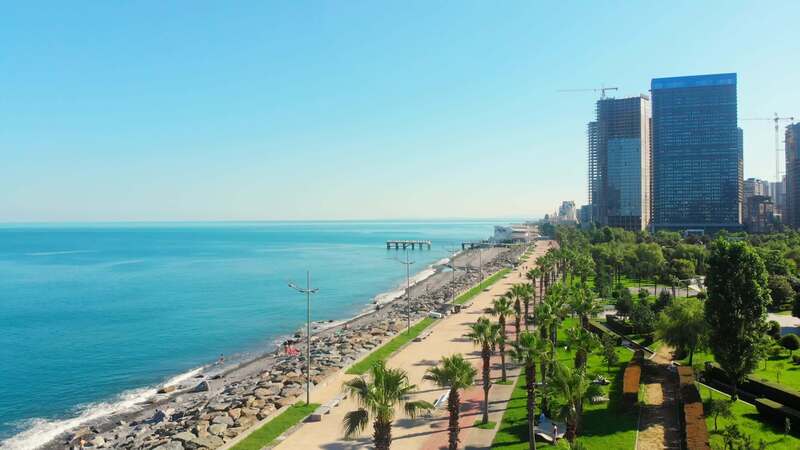
Modern Batumi skyline along the Black Sea coast

